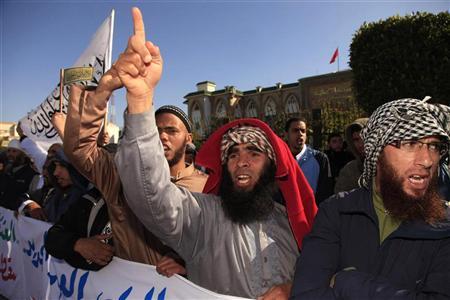RABAT (Reuters) – Moroccan police on Wednesday beat up protesters who were seeking to stage a demonstration in the capital Rabat in solidarity to anti-government protests in the north.

A police officer at the scene said the Rabat demonstration had not been authorized and denied police had used violence against the protesters.
A Reuters reporter and photographer saw at least three people injured after dozens of truncheon-wielding policemen chased a few hundred protesters around the streets of downtown Rabat. The demonstrators had been seeking to gather in front of a local government office.
“This was meant to be a peaceful protest. We are not carrying stones or swords here,” said Mounir Hantout, an activist from the Moroccan Association of Jobless Graduates, who had purple marks on his thigh.
Morocco has managed to avoid some of the Arab Spring turmoil that has struck other Arab countries. However, there are regular protests across the North African country against poverty, official corruption and the perceived failure of the state to help.
These protests have sometimes turned violent.
In the latest flare-up, clashes between protesters and police started on Friday in the town of Beni Bouayach, around 430 km (270 miles) north of Rabat.
Around a dozen police officers were seriously injured and two police vans were burned, according to local media. Police used tear gas and house-to-house searches to break up the protests, local newspapers reported.
What sparked the riots, residents said, was the arrest last week of a local activist during a demonstration to demand more government efforts to fight poverty.
The riots then spread to the nearby towns of Imzouren and Bouguidaren, prompting local members of parliament from the ruling Justice and Development Party (PJD) to demand an investigation.
The Rabat protesters wanted to show their solidarity and denounce what the said was excessive force by police in taming the protests in the north.
“We wanted to organise this protest to denounce a state of repression that prevails in our country in general and in particular to express our support for our brethren in Beni Bouayach,” Hantout said.

